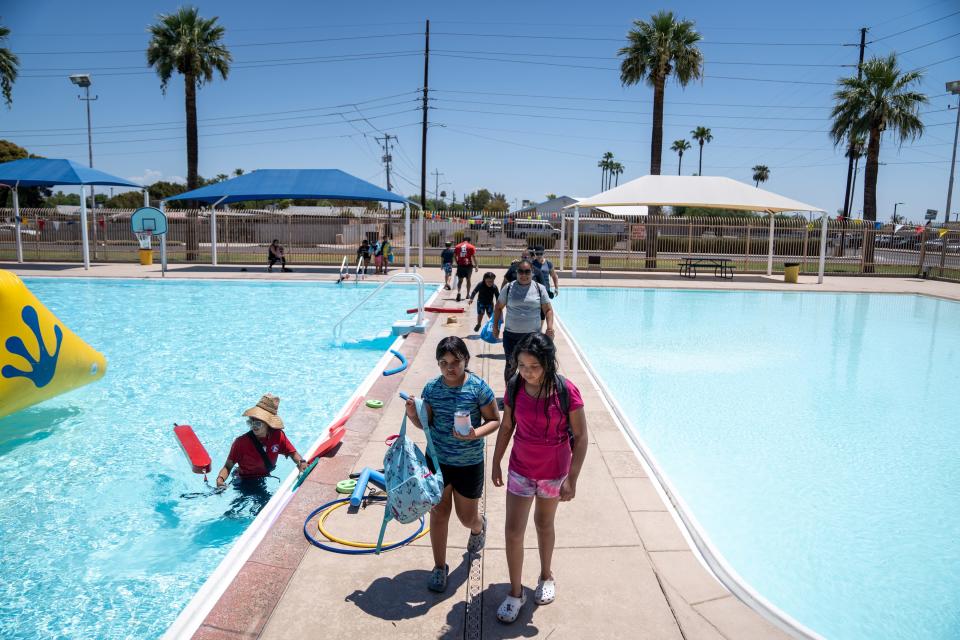Does the pool feel like a hot tub? You may need to skip the dip. Your extreme heat guide
It's summer and we in Phoenix are looking for ways to cool off in the extreme heat. Whether it's going out to eat something cold or taking a dip in the swimming pool to cool off from the heat.
Swimming in Arizona can be refreshing and a great way to spend the long summer days. But there are a few issues to consider, such as water temperature, sun exposure, health and potential dehydration. Wearing plenty of sunscreen is advised, staying hydrated and being cautious of sudden weather changes.
Here’s your guide to swimming in the heat and how to take care of your pool during the summer months.
It's 102 degrees in Arizona But it's too cold to swim. Here's why
What temperature is too hot for a swimming pool?

Swimming pool water is generally considered comfortable for most people when it’s between 77 and 82 degrees Fahrenheit.
It all depends on preferences. Some might find temperatures above 82 degrees to be too warm, while others might enjoy slightly warmer water.
"If you’re swimming laps, that may be too warm, but if you’re floating around in a leisurely fashion it could be too cold," according to Express Pool Care, a pool maintenance company with locations in metro Phoenix.
Is it safe to swim in 90-degree water?
Swimming in 90-degree water can be safe if you take proper precautions and pay attention to how your body is reacting. Here are a few things to keep in mind:
Hydration: According to LiveStrong, a health website that offers diet, nutrition and fitness tips, swimming in warm water can lead to increased perspiration and potential dehydration. It's crucial to stay well-hydrated before, during and after swimming.
Overheating: Extended exposure to water at very high temperatures can lead to overheating, muscle spasms, fatigue or heat-related illnesses, according to LiveStrong. Be aware of how your body is responding and take breaks as needed.
Individual tolerance: People have different levels of tolerance to warm water. Some may find 90-degree water comfortable while others might feel it's too hot.
Is it safe to swim when it's 100 degrees?
According to the Arizona Department of Health Services, swimming when the air temperature is 100 degrees Fahrenheit can be safe if you take certain precautions:
Stay hydrated.
Use sun protection: High temperature often means intense sun exposure. Use sunscreen and consider swimming during less intense sunlight hours (early morning or late afternoon).
Watch for signs of overheating.
Safety inspections in Phoenix Check out which pools and splash pads are clean
What happens if pool water gets too hot?
Swimming in water over 90 degrees isn't advised. If pool water gets too hot, these issues can arise:
Dehydration: Warm water can cause increased sweating, which may lead to dehydration if swimmers don't drink enough fluids to compensate.
Bacterial growth: "Consider getting a pool cover to reduce the growth of algae and keep debris out and it requires less chemicals and backwashing of your pool," according to Shasta Pools, a pool building company with multiple locations around metro Phoenix.
Chemical imbalance: Shasta Pools' website notes that elevated temperatures can affect the balance of chemicals in the pool, such as chlorine. This can impact water clarity and sanitation.
Reduced disinfection: Warmer water can decrease the effectiveness of chlorine and other sanitizing agents, potentially leading to inadequate disinfection.
Skin irritation: According to Medical News Today, prolonged exposure to overly warm water may cause skin irritation, rashes, or other skin-related discomforts.
How often should you shock your pool in the summer in Arizona?
In a hot and sunny climate like Arizona, where pools are frequently used and exposed to high temperatures, you might need to shock your pool more often than in cooler regions. "Shock your pool every 30 days,” According to The Swimming Pool Warehouse, a service and repair company in Scottsdale and Phoenix. They also recommend using 2 gallons of liquid chlorine or 2 packs of granular shock.
However, the specific frequency of pool shocking can vary based on factors such as:
Pool Usage
Temperature
Rainfall
Chemical Levels:
Algae Growth
How much does it cost to maintain a pool in Arizona?
The cost of maintaining a pool in Arizona can vary widely based on factors such as the size of the pool, its features, local labor rates and the specific maintenance tasks required.
On average, you can expect to spend anywhere from $3,000 to $5,000 per year for basic pool maintenance in Arizona, according to The Hill Group, an Arizona real estate firm.
Got a story you want to share? Reach out at Tiffany.Acosta@gannett.com. Follow @tiffsario on Instagram.
Support local journalism Subscribe to azcentral.com.
This article originally appeared on Arizona Republic: Is your pool too hot? What to know about swimming in 90 degree water

